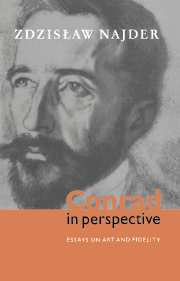Book contents
- Frontmatter
- Contents
- Acknowledgements
- Note on the texts
- List of abbreviations
- 1 Introduction, or confession of a mastodon
- 2 Conrad's Polish background, or from biography to a study of culture
- 3 Joseph Conrad's parents
- 4 Joseph Conrad and Tadeusz Bobrowski
- 5 The Sisters: a grandiose failure
- 6 Lord Jim: a Romantic tragedy of honour
- 7 The Mirror of the Sea
- 8 A Personal Record
- 9 Joseph Conrad's The Secret Agent, or the melodrama of reality
- 10 Conrad, Russia and Dostoevsky
- 11 Conrad and Rousseau: concepts of man and society
- 12 Conrad and the idea of honour
- 13 Joseph Conrad: a European writer
- 14 Joseph Conrad after a century
- 15 Joseph Conrad in his historical perspective
- 16 Fidelity and art: Joseph Conrad's cultural heritage and literary programme
- Notes
- Index
12 - Conrad and the idea of honour
Published online by Cambridge University Press: 07 December 2009
- Frontmatter
- Contents
- Acknowledgements
- Note on the texts
- List of abbreviations
- 1 Introduction, or confession of a mastodon
- 2 Conrad's Polish background, or from biography to a study of culture
- 3 Joseph Conrad's parents
- 4 Joseph Conrad and Tadeusz Bobrowski
- 5 The Sisters: a grandiose failure
- 6 Lord Jim: a Romantic tragedy of honour
- 7 The Mirror of the Sea
- 8 A Personal Record
- 9 Joseph Conrad's The Secret Agent, or the melodrama of reality
- 10 Conrad, Russia and Dostoevsky
- 11 Conrad and Rousseau: concepts of man and society
- 12 Conrad and the idea of honour
- 13 Joseph Conrad: a European writer
- 14 Joseph Conrad after a century
- 15 Joseph Conrad in his historical perspective
- 16 Fidelity and art: Joseph Conrad's cultural heritage and literary programme
- Notes
- Index
Summary
It is evident that the idea of honour was very important for Conrad as a person and stands at the heart of ethical problems that he raised in his books. Some of his contemporaries, such as Wells, noted this fact with an ironical shrug; others, such as Cunninghame Graham, with admiration. But even though the fact itself has been registered by many critics, the function and implications of the idea as present in Conrad's work remain by and large unanalysed. When Conrad deals with honour in its simple form, as in ‘The Duel’, Chance, or The Rescue, there is little chance for misinterpretation. But whenever the problems raised become more intricate and a deeper comprehension of the whole ethos of which honour forms the centre is required, confusion arises, for instance in interpretations of the final part of Lord Jim, or of the predicament of Nostromo.
Many critics simply fail to identify the moral and literary tradition to which Conrad belongs, and persist in interpreting him in the terms of, and as within, the conventions of middle-class nineteenth-century prose. And if one does not know the history and logic of the concept of honour, one certainly cannot appreciate what was new in Conrad's handling of it. Some of his greatest admirers, like Faulkner or Camus, seem to have seen it quite well, but we are unable to comprehend their links with Conrad as long as we do not place the connection in a historical perspective.
- Type
- Chapter
- Information
- Conrad in PerspectiveEssays on Art and Fidelity, pp. 153 - 164Publisher: Cambridge University PressPrint publication year: 1997



